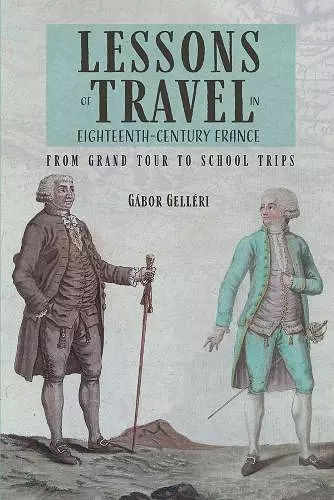Lessons of Travel in Eighteenth-Century France
From Grand Tour to School Trips
Format:Hardback
Publisher:Boydell & Brewer Ltd
Published:1st Feb '20
Currently unavailable, and unfortunately no date known when it will be back

A study of the literature of the 'art of travel' in eighteenth-century France, showing how consideration of who should travel and for what purpose provided an occasion for wider debate about the social status quo. Early modern educational travel is usually associated with the Grand Tour: a young nobleman's journey through the established highlights of Europe. Lessons of Travel presents how, in eighteenth-century France, this practice was heavily contested, and the idea of educational travel had far wider implications. Through the study of a huge range of both canonical and little-known sources discussing "the art of travel", from abbé Pluche's educational best seller, The Spectacle of Nature, through Rousseau's Émile to practical prospectuses for collective educational travel in the revolutionary period, Gelléri investigates what it meant to 'think about travels' in eighteenth-century France. Consideration of who should travel and for what purpose, he argues, contributed to an international intellectual tradition but also provided a pretext for debate on the social status quo, including such issues as the place of the merchant class, the necessity for professional training, the uses of travel for young women and the education of a new generation of citizens of the Revolution.
An extremely well-researched, well-argued and well-written book that deserves to be read not only by specialists in travel history and the Grand Tour, but also by scholars who take a keen interest in the intellectual history of eighteenth-century France and Europe. * FRANCIA *
[The author] has written a detailed study that reaches its goal of filling the historiographic gap on travel in eighteenth-century France. Gelléri offers insight into the mechanisms and functions of travel advice literature by examining its forms of discourse with great care. What is really to be applauded is Gelléri's ability to offer fresh analyses of well-known texts, such as Rousseau's Émile. Furthermore, Gelléri continually links the social and intellectual benefits of travel with its moral and sexual danger and carefully examines the question of who should be allowed to travel and for what reasons. -- Jérémy Filet, Université de Lorraine, France and Manchester Metropolitan University, UK * Journal for Eighteenth-Century Studies *
ISBN: 9781783274369
Dimensions: unknown
Weight: 566g
245 pages